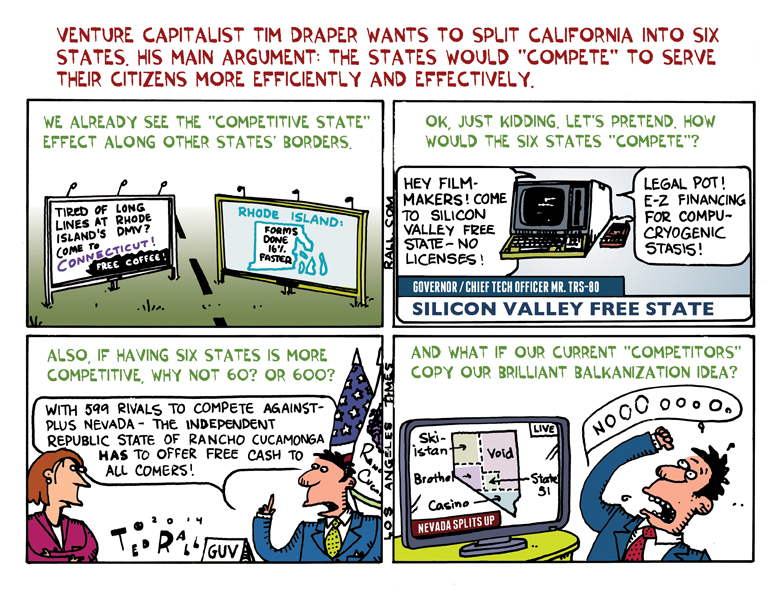Grandiosity comes standard when you’re a third-generation 1%er like venture capitalist Tim Draper. Among other things, the dorky 55-year-old claims to have invented viral marketing. (Whatever.) He founded a non-accredited “Draper University of Heroes” for aspiring entrepreneurs, based in part on Hogwarts. He’s a right-wing Republican who voted for Obama.
Draper’s latest foray into the political arena is a ballot initiative that, if he garners the required 807,000 signatures, will ask voters this November to do for the Golden State what the 1990s did to Yugoslavia — split California into six states. (This is his second dance. Voters rejected his mandatory school vouchers proposition in 2000. )
“California as it is is ungovernable,” Draper says. “It is more and more difficult for Sacramento to keep up with the social issues from the various regions of California. With six Californias, people will be closer to their state governments, and states can get a refresh.”
Actually, the result wouldn’t be six Californias. It would be six pieces of what used to be California:
San Diego + Orange County = “South California”
L.A. + Santa Barbara = “West California”
Bakersfield + Fresno + Stockton = “Central California”
San Francisco + San Jose = “Silicon Valley”
Sacramento = “North California”
Eureka + Redding metro = the awesome, totally not broke, new state of “Jefferson”
Is Draper’s measure a good idea? I don’t know. What I do know is that the arguments Draper makes in favor of balkanization make zero sense. Whatever the merits of his splitsville scheme, it’s scary to endorse anything ginned up by such a messy mind.
Consider these excerpts from Draper’s recent interview with Time. They make fellow right-wing multimillionaire Donald Trump look levelheaded in comparison:
We now spend the most and get the least. We spend among the most for education and we’re 46th in education. We spend among the most for prisons, and we are among the highest recidivism rates … So the status quo is failing. And there have been some very good people running California, governing California. So it must be systemic. At best, the system seems to be on a spiral down. At worst it’s a monopoly, and in a monopoly, they can charge whatever they want and provide whatever service they want. In a competitive environment, people get good service and they pay fair prices.
If California’s current woes are “systemic” — i.e., the result of California’s current size — why didn’t the same system “spiral down” during the state’s postwar boom years?
Draper says the state is a “monopoly” that “can charge whatever they want and provide whatever service they want.” To the extent that that’s true — just like businesses, governments are subject to constituent/customer pressure — it’s true of all governments. It’s not like drivers in West California will pay lower fees for their drivers licenses by picking them up in South California — or that South California would have any incentive to offer lower fees, i.e., compete.
You know how everything looks like a nail when you’re a hammer? When you’re a VC, everything looks like a business. But states aren’t businesses and people aren’t just consumers.
We don’t have to look far for examples of states whose capitals are closer to their citizen. New England is already divvied up into tiny states. “Our government will be more in touch with our individual constituents” if California breaks into smaller parts, says Draper. If he’s right, the New England states should be a shining beacon of governance. But they’re not. They’re just average.
There’s just no evidence that efficient or responsive service is related to a state’s size. History, resources and luck are the real determinants.
By most standards, Vermont and Massachusetts offer better services to their citizens than Maine or New Hampshire (not to mention livelier job markets). But they’re not “competing” against each other. Why don’t we see an exodus of former Mainers to Vermont? People who stay in Maine stay there because they like it. They grew up there. Their families are there. They dig the lobster rolls. Whatever. They’re not going to move to Massachusetts just to get Romneycare.
The strongest argument for Six Californias is that we are not well-represented. The people down south are very concerned with things like immigration law and the people way up north are frustrated by taxation without representation. And the people in coastal California are frustrated because of water rights. And the people in Silicon Valley are frustrated because the government doesn’t keep up with technology. And in Los Angeles, their issues revolve around copyright law.
Copyright law. Yep, that’s what all Angelenos care about. Who could ever forget the Intellectual Property Riots of 1992? Brother against brother, PC vs. Mac, VHS vs. Beta. Brrrrr.
Seriously, though, doesn’t Draper know that the federal government, not the state, has jurisdiction over border control? Tech regulations, the Internet — that’s the feds too. And copyright.
If the “strongest argument” in favor of breaking up California is to address issues that states don’t control…well, don’t make me say it.
Draper adds: “I’ve noticed that the people most adamant about creating their own state or being a part of their own state are the poorest regions, and in the current system, they are not happy, because it is not working for them. So if they had their own state, I believe all of those states would become wealthier.”
By Draper’s reasoning, Mississippi and Alabama — the nation’s poorest states — should split apart too. They’d all become wealthier, right?
As long as logicians like Tim Draper walk the earth, political cartoonists will never be out of work.

